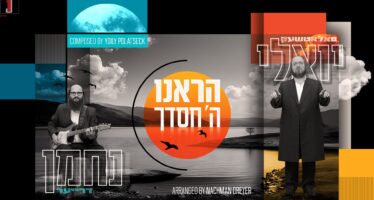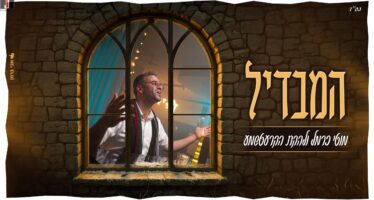[The Jewish Star] Kosher Bookworm: Reb Shlomo’s Torah legacy
![[The Jewish Star] Kosher Bookworm: Reb Shlomo’s Torah legacy](https://www.thejewishinsights.com/wp/wp-content/uploads/2011/10/even-shlomo-870x1299_c.jpg)
By Alan Jay Gerber
Rabbi Shlomo of Kartin said: “If you want to raise a man from mud and filth, do not think it is enough to keep standing on top and reaching down to him a helping hand. You must go all the way down yourself, down into mud and filth. Then take hold of him with strong hands, and pull him and yourself out into the light.”
Here’s another one, “When you tell stories about holy people, and you tell other people there are holy people in the world, it fills you with joy.”
Elie Wiesel, the Nobel literature laureate also has a word on this week’s author. “He would suffer with those who suffered. A lover of loving, he would never offend the person to whom he was speaking. Where others might use argumentation and recrimination, he preferred praise. I never once heard him speak ill of another, even of those who cared a little less for him.”
These words reflect upon one of the most charismatic personalities of previous century in Judaism. A rabbi, whose unique manner and method help save Judaism from the decay of a decadent civilization that surrounded us. Now, once more, the treasure that is Reb Shlomo’s legacy is to be found in a new work, “The Torah Commentary of Rabbi Shlomo Carlebach” by Urim Publications. The first volume of the upcoming series has Rabbi Shlomo Carlebach’s commentary on the first six parshiot of Sefer Bereishis contain perhaps among the most human and humane oriented takes upon the sacred divine text, thus truly enhancing its meaning and teachings. In his foreword to this work, Rabbi Shmuel Intrator notes the influences of the following rabbinic figures behind Rabbi Carlebach’s work.
“His teachings hold a depth that weave eternally through a tapestry of multi-layered interpretations and applications. This perspective to Torah study he inherited from his great master, Rav Aharon Kotler, the founder of the Lakewood Yeshiva, whose brilliant lectures are world renowned for their highly developed detailed Talmudic pilpul study.
“Reb Shlomo’s breadth of Torah and life scope, evident in many of his teachings, are an approach to Torah study that he learned from Rav Shlomo Heiman, the Rosh Yeshiva of Yeshiva Torah Vadaath who preferred a broader, more inclusive approach to a more detailed, developed one.
“Reb Shlomo’s application of sophisticated Talmudic and Halachic approaches to spiritual Chassidic and Kabbalistic concepts are clearly influences of his close apprenticeship with the last Lubavitcher Rebbe.”
These influences coupled with the teachings of Ishbitz and Breslov, all came together and are reflected in the Torah teachings that are to be found in this newly issued work of Reb Shlomo’s Torah teachings.
As an example of these teachings consider the following sampling from this week’s Parshat Noach. “Reb Nachman and all the Rebbes say that G-d never said, ‘Let there be water,’ so where did the water come from? The truth is that the water is the one thing, which is between before and after creation…”
Water is very pure; water is absolutely very pure which means in a certain deep way, water is untouched by creation. It’s created and yet it’s not created. So the thing is that obviously, the way the world was evolving ‘after creation’ was absolutely polluted, so G-d began pulling back. He didn’t destroy all creation but He went back half a step.”
In another teaching this in regard to prayer we learn the following, “You know why Noach didn’t pray for the world? Noach believed in G-d. He understood that G-d created the world, and now G-d wants to destroy it. So people are bad and there is nothing to do about it, they have to be wiped out. If someone is evil, then you got to destroy them.
“You know friends, if someone says to me, ‘I bought ice-cream for twenty-five cents and I don’t like it, I want to throw it out,’ I‘m not crying over it.
“If someone says to me, ‘ I bought something for a hundred million dollars and I want to throw it away,’ I say, ‘please don’t do this.’
“See what it is… Noach didn’t know what the world is, he did not know how precious the world is. Yes, he knew that it was a beautiful world. He knew there is one G-d, but, mamesh knowing what the world is all about, how deep the world is, how deep every human being is? This he didn’t know.”
I conclude this essay with the following observation by Rabbi Intrator. “The teachings in this book are not just meant to be read, but they are intended to be enjoyed and experienced as ‘holy music’. Ultimately they are intended as a lesson to live a ‘holy life.’”
Indeed, for those of us who enjoyed Reb Shlomo in life, these pages of learning will bring us back to the memories of the cadence of his voice in both prose and song. To those of you who never experienced him on the pulpit or stage kindly please obtain this work in the month to come and learn the first half of Sefer Bereishis as you never learned it before. For more information on this and future publications in this series you may want to check out www.CarlebachLegacy.com.
[Article from TheJewishStar.com]
Related Articles
The Smell of Holiday: Yossi Fried In A Festive Single – “Chanukah”
Yossi Fried launches a new song in honor of the days of Chanukah, which he composed and performed himself, with
Yoily Polatseck & Nachman Dreyer – Hareinu Hashem
In a world overflowing with noise, opinions and information — where truth feels harder than ever to recognize — we
Moti Carmel & The Kretshma Present: A Special Performance of Rabbi Ben-Zion Shenker’s “Hamavdil”
A new and exciting performance of Rabbi Benzion Shenker‘s “Hamavdil“, inspired by the familiar and beloved version by Fried –




